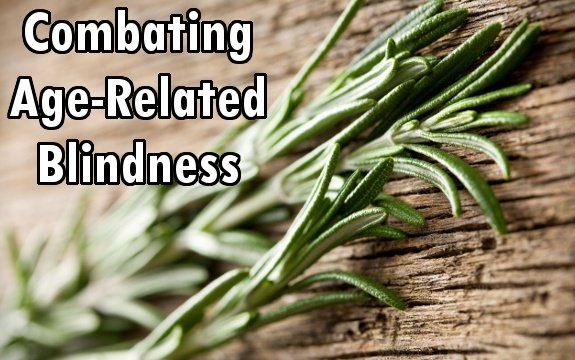Rosemary Herb Could Combat Age-Related Blindness

 Affecting close to 11 million Americans, macular degeneration is the leading cause of age-related blindness and is the most common eye disease in the U.S. While there are numerous ways to improve your eyesight no matter your age, one new study suggests something as simple as the herb rosemary could help combat age-related blindness, working to stop the progression of the disease caused by oxidative stress.
Affecting close to 11 million Americans, macular degeneration is the leading cause of age-related blindness and is the most common eye disease in the U.S. While there are numerous ways to improve your eyesight no matter your age, one new study suggests something as simple as the herb rosemary could help combat age-related blindness, working to stop the progression of the disease caused by oxidative stress.
Rosemary contains something known as carnosic acid; a primary compound credited with numerous health benefits offered by the culinary herb. Researchers with Sanford-Burnham Medical Research Institute say that this is the compound that could be the key to protecting eye health.
The study, published in Investigative Ophthalmology & Visual Science, looked at the effects of carnosic acid on eye health. When tested on retinal cells, the carnosic acid seemed to trigger the production of antioxidant enzymes, decreasing the number of free radicals present to damage the eye. The researchers also tested the rosemary compound on mice and found they suffered less vision damage when exposed to light.
They concluded:
“These findings suggest that CA may potentially have clinical application to diseases affecting the outer retina, including age-related macular degeneration and retinitis pigmentosa, in which oxidative stress is thought to contribute to disease progression.”
Read: The Expensive Spice that Reverses Macular Degeneration
The results of this study are hardly surprising given the many rosemary health benefits that have long been established. The woody herb has been prized for its health benefits for thousands of years. In recent years, science has further cemented its role as a medicinal plant by studying and confirming it’s many folk medicine applications.
Research has linked carsonic acid to brain protection, possibly helping to stave off mental decline and protect against strokes using its antioxidant benefits. It is also useful in pain management, digestive problems, and headaches. Used topically, rosemary can treat muscle pain, calm the skin, and help heal wounds.
Other benefits include:
- Anti-inflammatory
- Circulatory health
- Liver detoxification
- Cancer prevention
- Hair tonic
- Stress relief
- Memory enhancement
Like many herbs, we are only scratching the surface in our laboratories. Humankind has long known these plants have amazing benefits; science is only beginning to catch up.

very good news, good research you will achieve success and benefit for life.